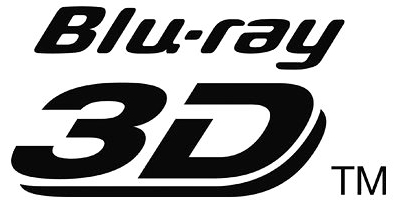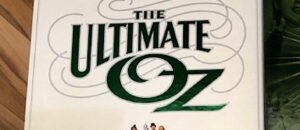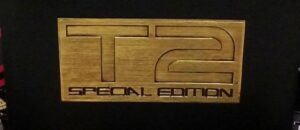This is undoubtedly the sort of thing that editors like myself put far too much thought into, while readers don’t give even a moment’s notice. Nevertheless, I feel that it’s worth mentioning that we’ll be changing the way we spell “3D” around here from now on.
Up until now, I’ve clung to spelling “3-D” with a hyphen, using the logic that it’s a contraction or acronym for “three-dimensional.” Both Dictionary.com and Merriam-Webster spell the term as “3-D,” and have no listings for the alternate “3D.” Consequently, I’ve forced that spelling onto the other writers here at the Bonus View blog.
 Nonetheless, the “3-D” spelling appears to be on the decline, while “3D” is rising fast. The official trademarked name for the Blu-ray 3D format has no hyphen, and most manufacturers of home theater equipment spell the term without any hyphen as well. Since Blu-ray and home theater are the topics we cover here, it seems fruitless to continue being stubborn on the subject. I’m just going to give in and spell it “3D” like everyone else in the industry.
Nonetheless, the “3-D” spelling appears to be on the decline, while “3D” is rising fast. The official trademarked name for the Blu-ray 3D format has no hyphen, and most manufacturers of home theater equipment spell the term without any hyphen as well. Since Blu-ray and home theater are the topics we cover here, it seems fruitless to continue being stubborn on the subject. I’m just going to give in and spell it “3D” like everyone else in the industry.
This will probably make no difference at all to any of our readers, but I felt that I should point it out in case anyone happened to notice.






Dick Ward
Just as long as we never use the phrase “digital download” I’m a happy man! 😀
William Henley
That is 2D there. :-p Or D^2. Yeah, lets do that, D^2 for Digital Download!
Or we can be complete jerks and talk about ThreeDee!
Josh Zyber
AuthorD2? What does the sequel to The Mighty Ducks have to do with this? 🙂
Dick Ward
Unleash the knucklepuck!
HuskerGuy
Quitter . . . lol.
Tim
There seems to be a movement away from “proper” punctuation for some reason.
“In my day we used a hyphen! You young punks with your no-hypen-usin’ 3D…”
William Henley
Totally agree. I would get into fights with people over the proper spelling / pronunciation of ya’ll / y’all / yawl / ya all / ye awl. However, it doesn’t seem to matter anymore, yall is accepted nowadays.
EM
By whom? The word being a simple contraction of “you” and “all”, “y’all” is the clear choice, as vetted by Merriam-Webster, American Heritage, and even Oxford.
I’ve been having trouble deciding how to write down the equivalent second-person plural used by many folks in the area I’ve settled in. Unfortunately, my dictionaries are less helpful with it. I think I’m going to go with “you-uns”—on the rare occasions that I have to write it at all.
EM
I should probably point out that one of the problems with the spelling “ya’ll” for the contraction of “you-all”—besides sloppy apostrophe placement—is that it looks like a significantly different contraction: that of “ya” (an alternate, colloquial pronunciation of “you”) and “will” (or, improbably, “shall”).
William Henley
You see, that is my argument – its NOT a contraction of the words “you” and “all” in texas, but is derived from Irish words, not English. In the rest of the south, however, it IS a contraction of the words “you” and “all”, as it was adopted from the Texas slang and localized. However, now that it is becoming acceptable to just drop the apostrophy all together, I am giving up the fight.
EM
The phrase “ye aw” is definitely English: it is not from the Irish language (a Celtic tongue, like Scottish and Welsh) but from a dialect of English attributed to ethnic Scots in Ireland, some of whom emigrated to America. While the origin of Southern-style “you-all”/“y’all”/whatever is debatable (and debated), I certainly find it plausible that the aforementioned community at the very least had some influence on its adoption.
In “ye aw”, “ye” is a second-person pronoun, sometimes still heard in dialect and once flourishing as a standard nominative form (e.g., from Genesis 3:3 in the King James Version: “…Ye shall not eat of it, neither shall ye touch it, lest ye die”). Generally throughout the English-speaking world, “ye” has been supplanted by “you”. The “aw” of the phrase is simply a dialectal pronunciation and nonstandard spelling of “all”. (Texans usually pronounce and write the L’s that most other English speakers do, don’t they?) Written in standard English, this phrase becomes “you all”, though if you prefer “ye all”, I won’t argue (do Texans often say “ye all” when speaking slowly or emphatically)? Either way, it’s easy to see that this phrase has given rise to a common contracted form, and the usual rules of English spelling suggest that “y’all” would be a far better spelling of that contraction than “yall” and especially “ya’ll” (which, as I mentioned earlier, does imply something else).
Of course, if your goal has not been to write in standard contemporary American English but to instead reproduce the writing style employed by 18th/19th-Century Scots-Irish immigrants to America with scant formal education, you have quite a lot of work to do!
William Henley
I did not notice this until I went over seas, but Texans usually do say “ye” instead of you. I was made fun of quite a bit for saying “Thank ye”. I found it odd, because, up until that time, I thought I was saying “thank ya”, and many Texans, if they spell coloquially instead of properly, will use “ya” instead of “ye” or “you”. Of course, people under 20 seem to think that “you” is spelled “u”.
I don’t mind much anymore, though, as I said. I have also come to realize that English is a constantly evolving language, and even most of the grammar and sentence structure rules I learned when I was a kid tend to be glossed over nowadays to the point that people don’t even realize they are using bad spelling, grammar and sentence structure.
It’s a loosing fight, and the point is, I can’t PROVE that I am right – It is assumed that “y’all” is the modern dereviation of “ye aw”, and the original spelling was “ya’ll”, but, yeah. I can’t prove it.
And just because Webster says its so doesn’t make it so. When Webster wrote his first dictionary, he purposely changed the spelling of many words to differentiate between English and American spellings. A good example is the English spelling “kerb” and the American Spelling “curb”.
Josh Zyber
AuthorIt’s a “loosing” fight? 🙂
EM
Well, Josh, it’s a fight over which spellings to loose onto the world at large.
As I understand it, the “ye aw” theory is based on a single letter (missive) written by a Scots-Irish immigrant in 1737. For what it’s worth, I did a little Internet searching and found a transcript of what I believe is the same letter, apparently written by a James Murray of New York. Here’s the first sentence in the letter that makes use of the phrase: “Now I beg of ye aw to come our here, and bring our wee ye aw the Cleaths ye can of every Sort, beth o’ Linnen and Woollen, and Guns, and Pooder, and Shot, and aw Sorts of Weers that is made of Iron and Steel, and aw Tradesmen that comes here, let them bring their Tools wee them, and Farmers their Plough Erons…”
Tim
One more thing related to 3D:
Josh, are you still planning to “upgrade” your theater system to 3D given the recent CES announcements of glassless-free 3D? Do you think we’ll have polarized glasses for use with home projection screens anytime soon?
Tim
Sorry, I, like many other consumers it appears, am a bit confused regarding 3D in the home.
Do you think we’ll have glassless 3D for projection screens in the home? Or is this technology only effective for traditional TV sets?
Do you see a polarized glasses system coming to home theater screens anytime soon or will it be reserved for active shutter glasses?
Josh Zyber
AuthorActually, the very first 3D home theater projectors were the passive type. The problem with these is that they require a special silver screen to maintain the polarization of the light, and those screens tend to wreak havoc with traditional 2D imagery. This essentially means that you need separate screens for 2D and 3D content.
Some screen manufacturers are working on material that will function with both types of imagery, but (having not tested one myself yet) I have to assume that will bring some compromises.
The active shutter glasses will work with existing screens. There’s a lot of debate and testing going on right now to determine which types of screen material provide the brightest 3D picture (brightness being the biggest obstacle to 3D projection), but even a basic white screen will fundamentally work.
Active or passive glasses don’t make much difference to me, personally. We’re still going to have to put glasses on in either case. Since I have no intention of replacing my screen (which would be a huge home improvement project), the active type will work better for me.
As for glasses-free projection, I think that’s going to be a novelty at best for the next several years. Glasses-free 3D TVs exist now, but have severe limitations in viewing angle. You basically have to sit exactly in the sweet spot or you won’t be able to watch at all. Projectors are perhaps going to be even more problematic in this regard.
James Cameron (who I think we can all agree is a huge advocate of 3D and a pioneer in the field) says that he thinks glasses-free 3D won’t be truly viable for 8-10 years. I’ll defer to him on that. That sounds plausible to me.
EM
Take heart, Josh: some of us do care about the hyphen. Like you, I have tended to include it in “3-D”, but the trademarking and other current influences have had me omitting it. I expect that an examination of my posts on the Bonus View might reveal some vacillation. Your note on the spelling/punctuation issue is appreciated; I feel less alone in my anguish over this vexing topic.
Really!! (Why are people snickering?!?)
Josh Zyber
AuthorHey, I’m just happy that anyone bothered to read my post about how to spell “3D” at all. I didn’t expect anyone to actually comment on it too!
William Henley
Aww come on, Dick, Jane, EM and myself comment on everything!
Gareth Callenby
Avoid the issue altogether and use the word “stereoptical.” Your readers will thank you.
Josh Zyber
AuthorJames Cameron calls it “stereo” when he talks about 3D.
EM
Hmm…when he starts pushing immersive holography, will he call it “surround”?